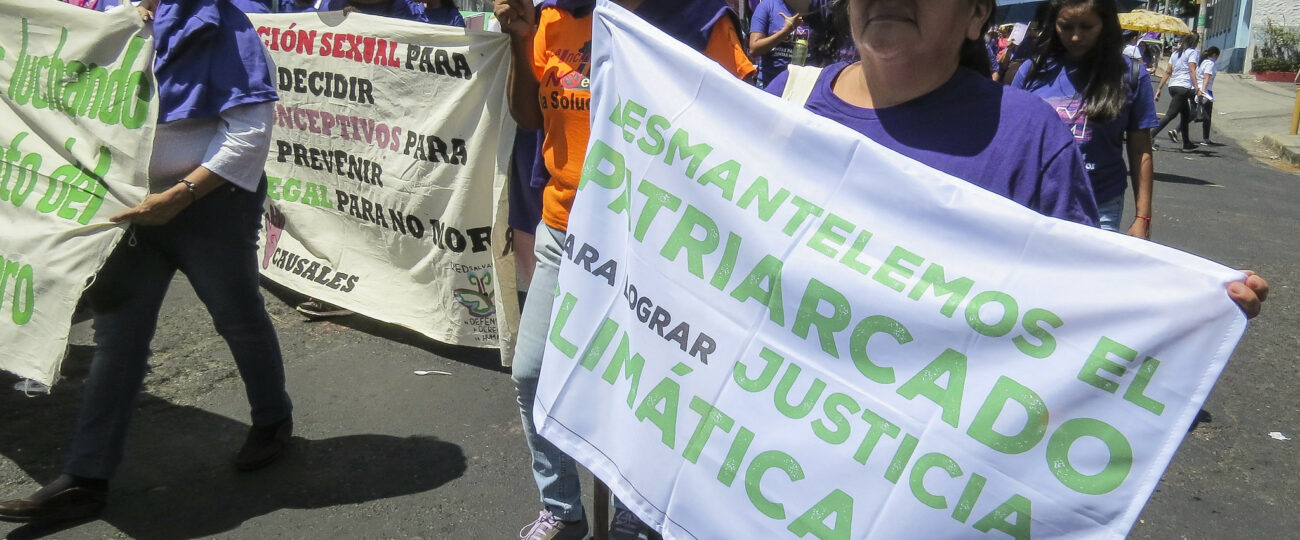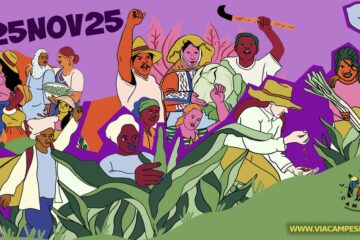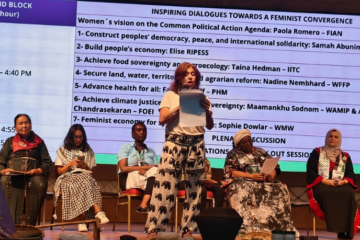The seriousness of systemic socio-environmental crises—climate, biodiversity, water, hunger, inequality, care crises—requires us to promote a much deeper coordination of struggles, processes of resistance, and political projects that are created through grassroots movements from the continent and the world.
It is impossible to fight crises from within national borders, or just at a territorial and local level. At the origin of crises, we identify a system of capitalist, patriarchal, racist, colonialist, and imperialist accumulation, which has been historically built based on slavery, genocide, the destruction of continents, and the subjugation of our peoples. It is a system of accumulation that continuously expands at a local level, incorporating new territories, but also new spheres of life in society. Fighting this system requires looking beyond the local or national level and adopting a regional and internationalist perspective.
Transnational companies are key actors in this process of accumulation that makes life and work increasingly precarious. They are the main characters of the process of destruction and dispossession of lands, forests, and waters. Their actions reach way beyond national borders. They have much more power than nation states and constantly impose their projects, norms, and logics, especially on a continent like ours, which has historically been incorporated into the capitalist system and the globalized neoliberal economy in a highly dependent way.
In Latin America, the process of accumulation led by powerful transnational companies and national economic groups is based on the extraction of raw materials and the exploitation of labor. This exploitation also affects our territories, our peoples, our bodies, and women’s work—especially racialized women. The power and impunity of transnational companies are strengthened with new norms in free trade agreements and bilateral investment treaties, as well as other neoliberal instruments. Transnational corporations actually have the power to file lawsuits against states when they consider that a public policy does not favor them. If they consider that a public policy that favors the common good can harm their profits, they file suits in international courts of arbitration, including the International Centre for Settlement of Investment Disputes (ICSID), which operates under the auspices of the World Bank. Courts of arbitration usually rule in favor of transnational corporations, attacking the sovereign capacity of states to decide on their most appropriate public policies.
This continuous violation of rights, this continuous attack on life that remains unpunished cannot be tackled from the local level only.
In grassroots feminism, we learn from the struggles of resistance on our continent and we understand the urgent need for the integration of the peoples, building unity in diversity to dismantle corporate impunity, the destruction of territories, and the continuous attacks on our rights, and to consolidate our emancipatory political projects. Indigenous, peasant, Quilombola, working, and grassroots women are those most affected by these processes of continuous destruction and attacks. They are also the ones who actually spearhead struggles and resist this offensive. Grassroots women play a central role as political subjects in the defense of territories and collective political proejcts. They are the ones who repeatedly organize and mobilize to fight corporate projects of accumulation.
We have learned from the sisters of the World March of Women how necessary it is to build regional grassroots political projects and collectively empower ourselves as grassroots political subjects. Amid a context of deep systemic crises that endanger the ecological systems that make life possible and the brutal offensive that the right and capital are launching in many countries across our continent, we have the responsibility and the duty to move forward in building unity around emancipatory political projects that allow us to dismantle the systems of domination, oppression, and exploitation of our peoples and nature.
Over the course of history, our organized peoples have built these emancipatory political projects and processes, including food sovereignty. These projects allow us to fight for imaginaries and meanings, as well as to establish the bases and principles that should organize our societies and allow us to provide a comprehensive, structural response to systemic crises.
We build integration around the resistance and struggle against the concentration of power and wealth, against inequalities, spoliation, land grabbing, pollution, and the destruction of territories resulting from the advances of agribusiness, mining, dams, fossil fuels. In face of that, unity and the building of integration imply the further deepening and consolidation of the proposals for the transformation of the food system, the energy system, the economic system, disrupting the dichotomies imposed on us by opposing society and nature, productive and reproductive work, and regarding the sexual division of labor.
It is also fundamental today on our continent to organize ourselves to fight for politics and public policies, because we need to regain control of the decisions made about the way our societies and our relationship with nature are organized. Battling for politics, as Nalu Faria has taught us, also means fighting for and decolonizing the state, redefining its role around the sustainability of life, the defense of nature, and the rights of the peoples. It is a profound battle, which redefines what is the state and how we build political institutionalities at a regional level, in a time when politics is being delegitimized and nefarious beings like Javier Milei in Argentina are imposed.
We have to fight for the economic sphere. Thanks to the World March of Women, we have provided fundamental contributions to all our movements around feminist economy. Feminist economy offers us the necessary principles and guidelines to organize the production and reproduction of life and make sure that our people’s needs are met. Principles that are shared with food sovereignty, which aim at a radical transformation of production, distribution, and consumption of everything that is necessary for life. From a regional perspective, feminist economy points to the organization on all levels, highlighting the relevance of the bond between grassroots classes from rural and urban areas. And organized women play an essential role in building food sovereignty on our continent. In this sense, we firmly oppose the green economy that is turning nature into a commodity and the attempts to impose it on our region. And we continue to struggle, as we have done throughout history, against neoliberalism, which is privatizing more and more spheres of life in society and nature. As it became clear during the pandemic, neoliberalism does not ensure the sustainability of life, but rather endangers life.
Regional integration must start by acknowledging care work as an organizing principle of economic processes and the need to put an end to the sexual division of labor, as well as the exploitation of women’s bodies and work. To do so, we must ensure the collective autonomy of women in processes of reviewing and reformulating our economies regionally.
There is an increasing battle for territories across the continent. On the one hand, there are peoples who feel and experience their territories as spaces of production and reproduction of life, as spaces of struggle, of political and cultural building, of memory. On the other, there are companies that see territories as a platform for accumulating capital, as a never-ending source of resources. Strenghtening the power and control of our peoples over their territories—both rural and urban—beyond borders is fundamental in this battle, resisting the reductive views that turn nature into units that can be traded in the market, and the transformation of nature’s features into services.
We must regain control of knowledge and technology, stressing their public character. As technology is privatized and becomes concentrated in the hands of a few companies, it becomes a tool for more exploitation of grassroots classes and nature.
Our perspective on integration must be based on internationalism, as the bases of unity and solidarity between the peoples and a new multilateralism. An integration that prevents criminal actions, like the ones that are being perpetrated today by the government of Israel against the Palestinian people. These processes of regional integration have been built over the course of history and continue to be built today. To empower political subjects through a regional emancipatory perspective, it is fundamental to learn our own history, to keep our memory alive, and especially to resist the imposition of new wicked imaginaries by the hands of the right.
Karin Nansen is a member of REDES—Friends of the Earth Uruguay and the Continental Day for Democracy and Against Neoliberalism. This is an edited version of her speech delivered during the webinar “Feminism and Regional Integration” held by the WMW Americas on November 30th, 2023.




